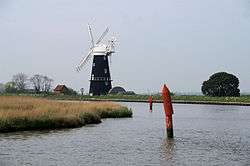Berney Arms



Berney Arms is a remote settlement on the north bank of the River Yare, close to Breydon Water in the English county of Norfolk. It is part of the civil parish of Reedham, is in the district of Broadland and lies within The Broads. It comprises a railway station, a windmill, a public house and a farmhouse[1] and is not accessible by public road.
Geography
Berney Arms is in an area of marshland, much of which is at or below sea level. It lies on the River Yare just to the west of Breydon Water. The area is part of Berney Marshes RSPB reserve[2] and within the Halvergate Marshes Site of Special Scientific Interest. These provide important habitats for a range of plant and invertebrate species as well as providing important wintering grounds for bird species such as Bewick's swan.[3] The area is also a Ramsar Site and part of the Broadland Special Protection Area. Ashtree Farm is used by the RSPB as a series of dwellings and as its base for the marshes.[4]
Berney Arms can be reached only by train, by boat or on foot and has no public road access, with only a private track running to it. Berney Arms railway station is a request stop on the Norwich–Great Yarmouth via Reedham line. It is served by a limited number of services each day, with a more frequent service on Sundays. Berney Arms is on the Weavers' Way and Wherryman's Way footpaths.
History
Berney Arms takes its name from The Berney Arms public house, which is situated by the staithe on the north bank of the River Yare and served walkers and boaters who pass through the area.[5] It was closed in 2015 and the owner proposed to turn the pub into a private house, but planning permission was refused. [6] The public house was named after the landowner Thomas Trench Berney who owned the Rheedam Cement Works centred on the Berney Arms Windmill. The mill was built in 1865 and is the tallest windmill in Norfolk at 21.5 metres (71 ft) tall. It was used to grind cement clinker and was later converted into a drainage mill. It closed in 1948 and is now a Scheduled Ancient Monument in the care of English Heritage.[7] At one point the mill supported a small settlement of 11 domestic dwellings and a chapel.[4] Berney sold the land on which the railway was built, on the condition that a stopping place was built to serve the settlement in perpetuity.[1][8][9]
Berney Arms was mentioned in Arthur Ransome's popular children's book Coot Club, which is in the Swallows and Amazons series.
References
- 1 2 Dunford. M & Lee.P (2012) The rough guide to Norfolk and Suffolk, Rough Guides UK, pp.107-109.
- ↑ About Berney Marshes and Breydon Water, RSPB. Retrieved 2014-02-19.
- ↑ Halvergate Marshes, SSSI citation, Natural England. Retrieved 2014-02-20.
- 1 2 Local character area 19 - Halvergate marshes (excluding Bure loop and the west of Tunstall dyke) Broads landscape character assessment, Broads Authority, 2006. Retrieved 2014-02-20.
- ↑ 'Remote' Berney Arms pub set for new business, BBC Look East, 2013-04-13. Retrieved 2014-02-19.
- ↑ Broads Authority Planning Committee September 2015
- ↑ Berney Arms Windmill, Pastscape, English Heritage. Retrieved 2014-02-19.
- ↑ McKie.D (2010) The rail to nowhere, The Guardian, 2010-07-11. Retrieved 2014-02-19.
- ↑ Mitchell.L (2010) Slow Norfolk and Suffolk, Bradt Travel Guides, pp.130-131.
External links
- Map sources for Berney Arms
- Berney Arms History Website
Coordinates: 52°35′19″N 1°38′29″E / 52.588535°N 1.641424°E